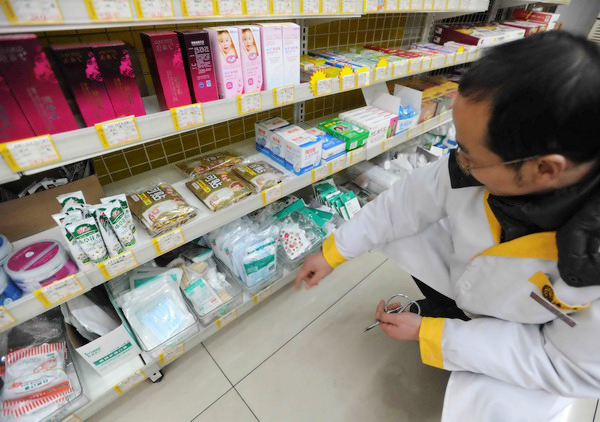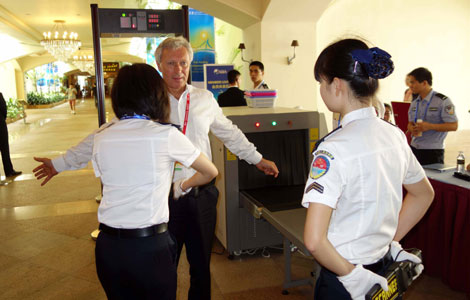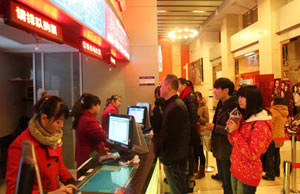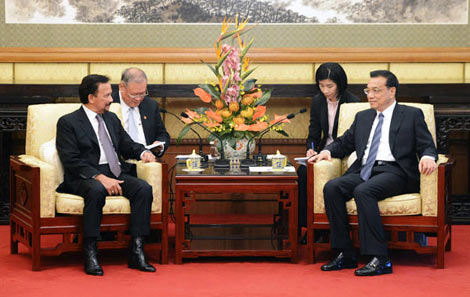
Urban mass transit and airport construction will have good opportunities for development even with the backdrop of an overall economic slowdown, because the government wants to relieve traffic congestion and provide better transportation services to citizens, according to Guosen Securities Co Ltd.
Liu Heming, a senior official of the Ministry of Housing and Urban-Rural Development, told chinanews.com in the middle of October that 34 cities have mapped out transportation networks stretching up to 4,300 kilometers, involving a total investment of 2 trillion yuan ($320 billion).
In the next 20 to 30 years, rapid urbanization development is expected to continue and the urban mass transit sector will experience its fastest-ever period of growth, Liu was quoted as saying.
|
 A salesman checks masks on a shelf at a drugstore in Chengdu, capital of Sichuan province, on Monday. Sales of masks remained at normal levels even though smog had shrouded the city for days. The city is located in a basin where haze is a constant visitor, especially in winter. [Photo / China Daily] |
Chen Hao, a senior executive at venture capital company Legend Capital, said in an interview with Zero2IPO Research Center that for venture capital and private equities in China, the investment opportunities next year and for an extended period will come from urbanization, and there are three sectors worth paying attention to - modern services, healthcare industries and consumer goods.
By the end of 2025, 70 percent of the Chinese population will live in cities, and in absolute terms - that would be about 900 million to 1 billion, based on the current population. By the end of 2030, more than 220 cities will have populations exceeding 1 million, with an increase of 400 million city dwellers, Chen said.
In Chen's opinion, most of the 400 million new city dwellers will work in and be customers of the service industry. The modern service industry operates with the application of high-tech approaches such as IT and modern management, and therefore has more advantages over the general service industry. Services concerning consumption, production and finance are what he thinks will flourish in the future.
The healthcare industry is more complicated because it involves government administration, medical system reform and business operating systems. The requirements of investors who plan to invest in this field are more demanding.
The healthcare industry has bright prospects with the aging Chinese society. Urbanization will generate greater demand for medical services from the public, Chen said.
In China, the medical equipment industry has exceeded 100 billion yuan with an annual average growth rate of 23 percent. It is estimated that the market scale will reach 340 billion yuan in 2015.
Moreover, medical apparatus only takes up 14 percent of the total medical industry while the figure of the global market has reached 42 percent.
Li Qiushi, an analyst at Guotai Junan Securities Co, said in a research report that urbanization is expected to drive 250 billion yuan growth in the pharmaceutical market.
Grain supply concern amid fast urbanization: report
Shopping malls boom in China on urbanization
China vows to accelerate urban renovation
 'Cat model' to dazzle Shanghai auto show 2013
'Cat model' to dazzle Shanghai auto show 2013
 Models at Tokyo modified car show
Models at Tokyo modified car show
 Shanghai Fashion Week focuses on domestic brands
Shanghai Fashion Week focuses on domestic brands
 Angel-dress models at Shandong auto show
Angel-dress models at Shandong auto show
 Safe and Sound
Safe and Sound
 Theater firms scramble for managers
Theater firms scramble for managers
 Premier pledges closer ties with Brunei
Premier pledges closer ties with Brunei
 Volkswagen's all-new GTI at New York auto show
Volkswagen's all-new GTI at New York auto show